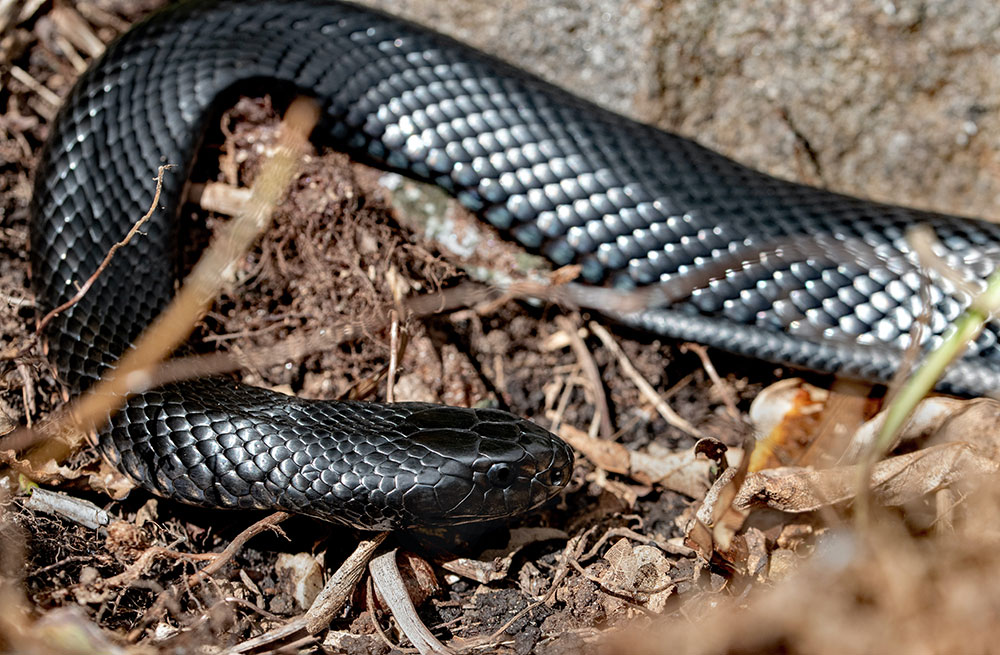Out of the thirty-eight snake species in North Carolina, only six are venomous. Snakes “eat where they live” meaning they don’t travel far. A snake is most likely in your home hunting for a food source (rodents).
Most Common Snakes of the Triangle
- Rat Snakes
- Garter Snakes
- Green Snake
- Corn Snake
- Rattlesnakes

Snake Control

Snake Trapping
Snakes are notoriously elusive. Humanely trapping a snake in your house can take time and patience. Usually, the snake leaves on its own. The most effective snake control method is to eliminate what attract the snake into your house in the first place.

Snake Exclusion
With all of the creatures out of your home, it’s time to seal up any holes in your home. Remember, snakes can squeeze through very small openings. So, it’s critical to eliminate all possible entry points. Finally, it’s a good idea to clear debris piles and mow your grass frequently to avoid a persistent snake problem.

Remediation
Snakes do not cause much physical damage. They will leave feces and shredded snake skin behind. If the snake was hunting rodents, there could be larger concerns like ectoparasites, disease spread, and damage to your home.
Snakes in the House
Snakes in the house typically enter either by accident or in search of food and shelter. Either way, most snakes tend to come in on the ground floor of a structure. The reptiles find entrances via gaps under doors or openings in the walls and foundations, around plumbing and vents, and even through pet doors. Snakes prefer to hide in well-covered areas outside, including firewood piles, leaf litter, tall grasses, and rock walls. If such areas are near the structure, snakes can easily gain access to the home.
The reality of a snake infestation is that you likely have an underlying rodent problem. Although it’s possible for snakes to choose your home as a shelter, most enter homes on the hunt for prey. Snakes eat a wide variety of rodents. So, if there’s a snake regularly coming into your home, it’s important to assess your home for signs of other pests.
Snakes cannot create their own entry point. But they can squeeze through small holes. Depending on the snake, it might be able to fit into a quarter-inch-sized hole. And you might be surprised to learn that snakes can slither up the side of your house! So, even holes well off the ground need to be investigated. Homeowners may find snakes in various areas of the home, but most are found in basements, crawl spaces, dirt cellars, and garages. Certain tree-dwelling snakes can enter into attics through holes in the roof, as well.
Signs of Snake Infestation
A snake infestation can be difficult to spot. That’s because these smooth critters rarely make their presence known.
A few definite signs of a snake problem include shed snakeskins and snake droppings. But you may also notice strange smells or tracks around the house. Some snakes will lay eggs in the late summer, which you may spot in the loose spot around your yard.
Problems with Snakes
In general, snakes won’t interact with humans if given a choice. They’ll slither by in the dark corner whenever possible. But if you surprise a snake or try to handle it, you might end up with a nasty bite.
Snake Damage
If given a wide breadth, the most harm a snake will do is give you an uncomfortable scare. And you might face sleepless nights knowing that a snake is living somewhere in your home. Unlike most animal issues, you won’t experience extensive property damage as a result of a snake. However, whatever prey the snake is chasing might do plenty of damage on its own. For example, rats are a preferred prey of snakes that can tear up insulation, chew on wires, and bring diseases into your home.
Health Hazards
A snake bite is a serious situation. If bitten by a venomous snake, it’s critical to seek medical care immediately. Even if the snake is non-venomous, you’ll receive a painful puncture wound that should be tended to by a medical professional.
Call Trutech IN
At Trutech, we have the expertise to handle any nuisance wildlife problem you may have.

Our professional team of licensed technicians will quickly and humanely handle your wildlife needs
Quick Links
Business Hours
- Monday-Friday: 7:30am-6pm
- Saturday: 9am-5pm
- Sunday: Closed
